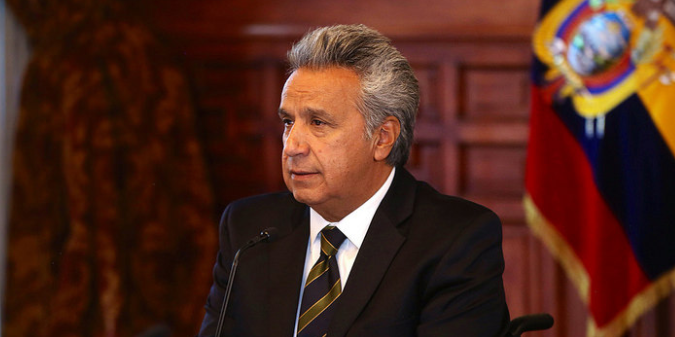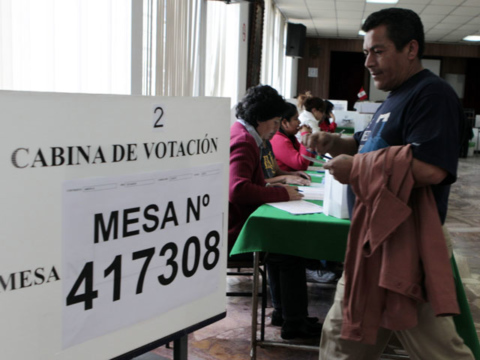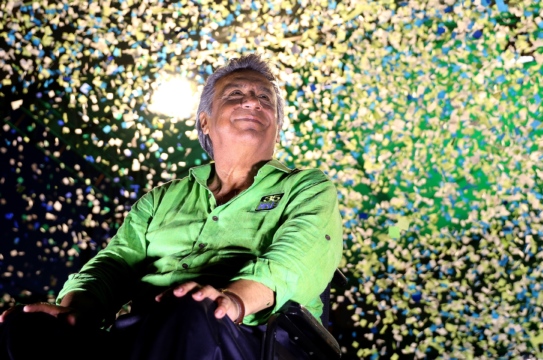The “Other” Latin America
The formal launching of CELAC revealed the strength of regionalism in Latin America.
A Daily Publication of The Dialogue
A mission of the International Monetary Fund and Ecuadorean officials have agreed on the terms of a $4.2 billion loan program, which is now up for consideration by the lender’s executive board. If approved, it would give Ecuador access to $250 million, in addition to $550 million it has already received. What actions has Ecuador’s government taken to comply with its commitments under the IMF agreement, and have they been successful? In what sectors or programs have the funds received to date been invested, and where would the additional money be targeted? How well is President Lenín Moreno’s administration handling the economy, and to what extent will the IMF loans help boost growth in the short and long terms?
Mauricio Pozo, former Ecuadorean finance minister and academic advisor at Universidad Internacional SEK: “In 2019, the government signed a three-year agreement with the IMF and other multilateral entities. The agreement established a financing amount of around $10.3 billion to be delivered quarterly, given the fulfillment of macroeconomic goals such as fiscal balance, international reserves level and primary surplus. In addition to the quantitative goals, it established qualitative goals, such as a tax law, a labor law and issues related to the monetary and financial code. This means that in the quarterly reviews, the IMF will verify the fulfillment of goals in order to make disbursements. In the first two quarters, the quantitative goals were met, which would result indeed in a delivery of the funds. According to Ecuadorean law, public indebtedness must be used for investment expenses, and if debts are contracted to pay previous debts, the new ones must be in better financial conditions. Therefore, it is to be assumed that these regulations are being complied with. However, since debt disbursements constitute cash flows that enter a budget where about 70 percent are current expenses, there may be use of resources in current expenses. Within what is earmarked for capital expenditures, the specific projects to which the funds are allocated are unknown, given the poor state spending structure. The president has implemented the IMF program despite political restrictions. However, the laws sent to the Assembly are of unpredictable results, due to the division between the different political sectors.”
Caterina Costa de García, president of the Guayaquil Chamber of Industries: “The IMF requires Ecuador to meet some quantitative targets, and it is up to the authorities to define the measures to be taken to meet them. The chief target has to do with the reduction of the non-oil deficit of the non-financial public sector. The NFPS is the wider gauge of the public sector, including social security, which in Ecuador is mainly separate from the government, public sector enterprises (such as those for oil, electric energy and telecommunications) and local governments. The figure being monitored includes all non-oil revenues and all non-oil expenditures, plus fuel subsidies. So, the target may be met by a combination of raising taxes and reducing expenditures and oil subsidies. It excludes any possible improvement of finances from a higher price of oil. There are also commitments for changing laws to increase tax revenues, reducing costs of doing business and removing the Finance Ministry’s control over the central bank. The IMF is also providing assistance to improve government institutions and enhance competitiveness, for instance in customs. The government is fully in agreement with the actions agreed to with the IMF. This is a sharp reversal as compared to the situation under the previous government, when the deficit grew every year as Ecuador’s competitiveness deteriorated. We in business are sometimes impatient with the pace of reform. However, we are aware that this momentous policy changes are easier said than done.”
Juan J. Paz-y-Miño Cepeda, Ecuador-based contemporary historian: “Thanks to citizen pressure, the agreement with the IMF was unveiled. It has no conceptual difference with the 16 ‘Cartas’ that Ecuador signed between 1983 and 2003. The agreement is not only with the IMF (of $4.2 billion) but also with other institutions (of $6 billion), whose disbursements will depend on compliance with the IMF. The first funds have already been received. They cover the state’s liquidity, internal payments and some assistance programs, but they do not change structures of the country’s inequality and the concentration of wealth. Public investment remains paralyzed. However, the IMF evaluation is positive, expecting Ecuador to adopt new measures. These were just completed on Oct. 2, with the government’s proposed tax reform, the release of fuel prices, a labor reform that threatens rights, future privatizations and further reduction of the state. The IMF will surely rate the country positively to continue with other disbursements—all in the framework of reviving a ‘business model’ inspired by neoliberalism, which only benefits private and conservative elites with no social responsibilities. As historical experience, existing studies and even official statistics have demonstrated, this model has again aggravated the population’s living and working conditions. And it has awakened the first street protests. The IMF has once again gone down a well-known economic path, with dire social results.”
The Latin America Advisor features Q&A from leaders in politics, economics, and finance every business day. It is available to members of the Dialogue's Corporate Program and others by subscription.
The formal launching of CELAC revealed the strength of regionalism in Latin America.
Michael Shifter es entrevistado por La Tercera sobre las elecciones en Ecuador: “Si Moreno no gana en primera vuelta, obviamente el correísmo habrá perdido fuerza. Lenín Moreno no es Correa”.
While many talk about the return of the right in Latin America, Rafael Correa’s “citizen revolution” won another term in office: former vice president Lenín Moreno will rule until 2021 after defeating former banker Guillermo Lasso in a close second round vote. Although the opposition candidate denounced electoral fraud, other Latin American governments, as well as the observation mission of the Organization of American States (OAS), have recognized the results. On May 24, then, Correa will hand his chosen successor the presidency and a series of challenges: economic decline, social polarization and (less urgent) a foreign policy in need of some adjustments.
 The International Monetary Fund and the government of Ecuadorean President Lenín Moreno agreed on the terms of a loan deal in March. // File Photo: Ecuadorean Economy.
The International Monetary Fund and the government of Ecuadorean President Lenín Moreno agreed on the terms of a loan deal in March. // File Photo: Ecuadorean Economy.

